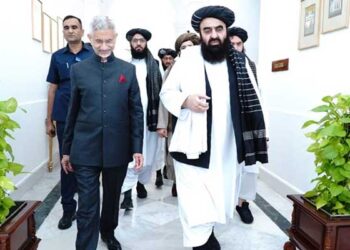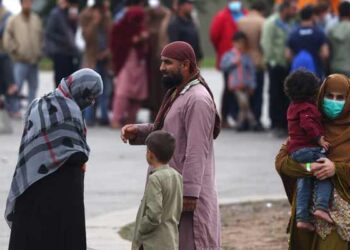Select Language:
The recent move by Russia to officially recognize the Taliban government has sparked mixed reactions among Afghans. While some believe this development could lead to greater economic opportunities, others remain doubtful about any positive changes in their lives.
On Thursday, Russia became the first nation to acknowledge the Taliban regime, following a series of diplomatic efforts. These included lifting the Taliban’s designation as a “terrorist organization” and accepting their ambassador.
Since the Taliban took control in 2021, after the withdrawal of U.S.-led troops, no other country had recognized their authority. This period has seen Afghanistan struggling as one of the world’s poorest nations, attempting to recover from decades of conflict.
“Given the current circumstances in Afghanistan, everyone is apprehensive. We’re concerned that if the world accepts us, it may help, even in the smallest way,” said Gul Mohammad, 58, speaking from Kabul.
Despite his painful memories of the Soviet invasion in 1979, which left him a refugee in Pakistan, he acknowledges that “the situation has changed.”
Jamaluddin Sayar, 67, is optimistic, claiming that “trade and economic opportunities will flourish now.” The retired pilot urged both Western and Eastern countries to recognize the Taliban’s government and cease their negative portrayals of the Islamic Emirate—as the Taliban refers to their regime.
Russian and Afghan officials heralded this recognition as a promising start for enhanced cooperation, especially in areas like economy and security. The need for coordination around security has been pivotal, as there are concerns that Afghanistan might become a breeding ground for extremist activities.
The Taliban has emphasized its commitment to maintaining security and has assured the international community that Afghan territory will not be used for attacks against other nations.
However, tensions have arisen with Pakistan after a notable rise in militant activities since the Taliban took over, and a deadly attack attributed to ISIS in Afghanistan claimed 137 lives at a concert in Moscow last year.
In a country where expressing dissent is severely restricted, some residents of Kabul hesitated to voice their criticisms of the Taliban government. One young man, who preferred to remain anonymous, expressed skepticism about the benefits of improved relations with Russia for everyday Afghans. “I worry that Afghanistan will again fall into Russian traps, and the challenges will only multiply. The struggle for the people will continue, regardless of recognition,” said the 25-year-old who is currently unemployed.
For activists advocating for women’s rights in Afghanistan, especially those who have pushed for isolating the Taliban regime, this recognition is seen as a setback that may further legitimize the restrictions placed on women.
Hoda Khamosh, an Afghan women’s rights activist based in Norway, pushed back against the idea that this recognition would lead to positive change. “Human rights organizations are currently working to highlight gender apartheid in Afghanistan, as the Taliban continues to suppress women. Therefore, such recognitions will accomplish nothing for us,” she stated.






